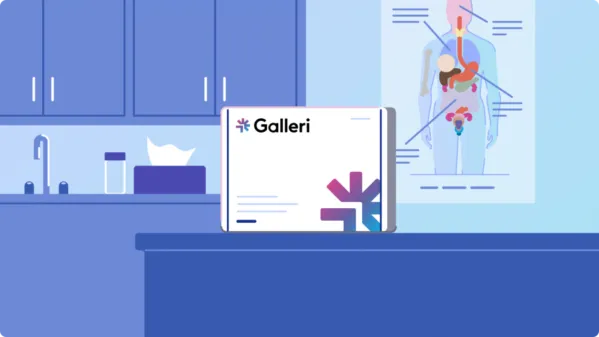A new way to screen for more cancers
Go further with Galleri®. Adding Galleri, a multi-cancer early detection test, to your cancer screenings allows you to go beyond what's recommended currently. Now you can screen for a signal shared by more than 50 types of cancer with Galleri.1
The Galleri test does not detect a signal for all cancers and not all cancers can be detected in the blood. False positive and false negative results do occur. Galleri should be used in addition to healthcare provider recommended screening tests.

The Galleri test does not detect a signal for all cancers and not all cancers can be detected in the blood. False positive and false negative results do occur. Galleri should be used in addition to healthcare provider recommended screening tests.
Galleri screens for a signal associated with active cancer
Galleri checks more than 100,000 DNA regions and over a million specific DNA sites to screen for a signal shared by cancers that could be hiding.2 The Galleri test looks for cell-free DNA and identifies whether it comes from healthy or cancer cells.1 DNA from cancer cells has specific methylation patterns that identify it as a cancer signal. Methylation patterns also contain information about the tissue type or organ associated with the cancer signal to help guide next steps.3

Backed by rigorous clinical evidence
Galleri was evaluated in clinical studies with over 20,000 participants.1,4 The test was developed by GRAIL and its clinical laboratory is certified under the Clinical Laboratory Improvement Amendments of 1988 (CLIA) and accredited by the College of American Pathologists (CAP).

Go further with cancer screening
Galleri redefines what’s possible. Only 5 cancers have recommended screening tests.5 Adding Galleri to these tests can increase the chance of finding cancer early, when there may be more treatment options.4 Galleri screens for a signal shared by multiple cancers that would otherwise go unnoticed.1,4 If a cancer signal is identified, Galleri predicts the tissue type or organ associated with the cancer signal to guide next steps.1,4
Galleri is a screening test and does not diagnose cancer. Diagnostic testing is needed to confirm cancer.

The Galleri test is recommended for use in adults with an elevated risk for cancer, such as those age 50 or older. The test does not detect all cancers and should be used in addition to routine cancer screening tests recommended by a healthcare provider. The Galleri test is intended to detect cancer signals and predict where in the body the cancer signal is located. Use of the test is not recommended in individuals who are pregnant, 21 years old or younger, or undergoing active cancer treatment.
Results should be interpreted by a healthcare provider in the context of medical history, clinical signs, and symptoms. A test result of No Cancer Signal Detected does not rule out cancer. A test result of Cancer Signal Detected requires confirmatory diagnostic evaluation by medically established procedures (e.g., imaging) to confirm cancer.
If cancer is not confirmed with further testing, it could mean that cancer is not present or testing was insufficient to detect cancer, including due to the cancer being located in a different part of the body. False positive (a cancer signal detected when cancer is not present) and false negative (a cancer signal not detected when cancer is present) test results do occur. Rx only.
The GRAIL clinical laboratory is certified under the Clinical Laboratory Improvement Amendments of 1988 (CLIA) and accredited by the College of American Pathologists. The Galleri test was developed — and its performance characteristics were determined — by GRAIL. The Galleri test has not been cleared or approved by the Food and Drug Administration. The GRAIL clinical laboratory is regulated under CLIA to perform high-complexity testing. The Galleri test is intended for clinical purposes
Klein EA, Richards D, Cohn A, et al. Clinical validation of a targeted methylation-based multi-cancer early detection test using an independent validation set. Ann Oncol. 2021;32(9):1167-77. DOI: https://doi.org/10.1016/j.annonc.2021.05.806.
Liu MC, Oxnard GR, Klein EA; et al. for CCGA Consortium. Sensitive and specific multi-cancer detection and localization using methylation signatures in cell-free DNA. Ann Oncol. 2020;31(6):745-759. DOI: https://doi.org/10.1016/j.annonc.2020.02.011.
Thierry A, El Messaoudi S, Gahan P, et al. Origins, structures, and functions of circulating DNA in oncology. Cancer Metastasis Rev. 2016;35:347–76. DOI: https://doi.org/10.1007/s10555-016-9629-x.
Schrag D, Beer TM, McDonnell CH, et al. Blood-based tests for multi-cancer early detection (PATHFINDER): a prospective cohort study. Lancet. 2023;402:1251-1260. doi: 10.1016/S0140-6736(23)01700-2.
US Preventive Services Task Force (USPSTF) recommended cancer screening tests, Grade A,B,C. https://www.uspreventiveservicestaskforce.org/uspstf/topic_search_results